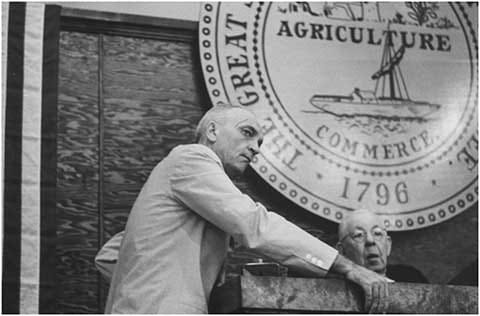Raulston Schoolfield Made Enemies Amid his Rise to Power

The life of Scott Raulston Schoolfield from birth around 1905 until his death in 1982 was filled with controversy.
Born into a family of attorneys in Bledsoe and Hamilton counties, he was destined to be a lawyer. His father, William A. Schoolfield, was one of the most successful and wealthiest trial attorneys in the era. His life ended in 1931 when he had a heart attack on the way to court to present a black client.
Raulston Schoolfield entered Baylor School as a freshman in 1919 but left at the end of his sophomore year and received more schooling at Chattanooga High School on Third Street. He twice attended Burritt College near Spencer, Tennessee, before being asked to withdraw.
Still without a high school degree, he entered Maryville College in 1924. However, he failed to finish the fall semester.
He graduated from Cumberland Law School in Lebanon, Tennessee, with a law degree in June, 1926. He practiced law in Chattanooga with his father, William A. Schoolfield and his uncle, Henson Schoolfield until he later withdrew from the firm in the late 1920’s, and with his father until he died in 1931.
Without the benefit of his father’s guidance and after the death of his first wife, Beth, during childbirth, young Schoolfield underwent several episodes of bad judgment and was reprimanded by the Chancery Court of Hamilton County. He apologized to the court, and no further disciplinary action was taken.
A lifelong Democrat, he entered his fist political race for district attorney general in 1942 and lost in the primary to Peabody Howard.
In 1945, he ran again for district attorney general and lost to W. Corry Smith in the Democratic primary. Smith became a lifelong enemy and played a major role in Schoolfield’s legal problems, culminating in his impeachment by the Tennessee General Assembly in 1958.
As a reform candidate, he ran for Criminal Court judge in 1948 with the support of attorney Jac Chambliss and other in the Good Government league, which was created to break up the “machine politics” prevalent in the county after World War II. Chambliss would later become a political enemy and prominent member of the group attempting to impeach Schoolfield.
Re-elected in 1950, Schoolfield was at the height of his political power until falling out with some of his former supporters, who alleged he abused his judicial power and accepted a bribe to “fix” 13 labor violence cases involving the Teamsters Union. Although Schoolfield’s colleague in Criminal Court, Judge L.D. Miller, Sr., ruled the same way as Schoolfield in 19 identical cases, no allegation of misconduct was made against Miller.
A congressional committee investigation into labor-management corruption headed by Sen. John McClellan of Arkansas first heard testimony about the Teamsters cases in Chattanooga in December 1957. When Schoolfield refused to voluntarily appear, the committee made further inquiries into his record as a judge.
Robert F. Kennedy, brother of future President John F. Kennedy and legal counsel in the committee, and Teamsters President James Hoffa became bitter foes during the committee hearings. John Seigenthaler, a reporter for the Nashville Tennessean, was a prominent participant in the investigation.
Schoolfield had also incurred the political displeasure of Tennessee Gov. Frank G. Clement when Schoolfield ran unsuccessfully for governor in 1954 as a single issue candidate opposing integration.
Schoolfield was impeached by the state Senate in 1958 and lost his criminal court judgeship.
However, he won a Hamilton County General Sessions judgeship in 1974 as a non-lawyer judicial officer, and was re-elected to a second eight-year terms in 19882, two months before his death on October 5 at age 76.


